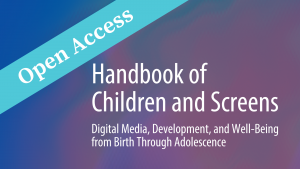Social development for today’s youth often includes navigating online social cruelty, such as cyberbullying and non-consensual sexting. On this episode of Screen Deep, host Kris Perry is joined by cyberbullying expert Dr. Elizabeth Englander, Executive Director of the Massachusetts Aggression Reduction Center at Bridgewater State University, to discuss her research on teens’ online social behaviors, including cyberbullying and sexting, and her perspective on how to help youth develop resilience with these challenges. Dr. Englander addresses the risk factors associated with these behaviors, including why children engage in them, potential mental health impacts, and who is most vulnerable. Parents will find actionable guidance on how to intervene proactively by initiating conversation, as well as what to do if you suspect your child is a victim of cyberbullying.
Listen on Platforms
 About Elizabeth Englander
About Elizabeth Englander
Dr. Elizabeth Englander is an award-winning author and the founder and Executive Director of the Massachusetts Aggression Reduction Center at Bridgewater State University, a Center which delivers programs, resources, and research for the state of Massachusetts and nationwide. She is also a Founding Member of the Social and Emotional Research Consortium (SERC). As a researcher and a professor of Psychology for more than 30 years, she is a nationally recognized expert in the area of bullying and cyberbullying, childhood causes of aggression and abuse, and children’s use of technology. Dr. Englander has published more than 100 articles in scientific journals and in publications such as Scientific American and the New York Times, and has been quoted hundreds of times in media outlets like The New York Times, The Economist, National Public Radio, and many others. She was named Most Valuable Educator by the Boston Red Sox and in 2018, she was appointed to the Massachusetts Governor’s Juvenile Justice Advisory Council. She is on the Scientific Advisory Board for the Institute of Child Development and Digital Media, and in 2023, her 9th book (You Got A Phone!) was awarded a National Parenting Product Award. Her 10th and most recent book, Bullying and Cyberbullying: A Guide for Educators and Parents, was published in December by Harvard Educational Press.
Dr. Englander has served as a Special Editor for the Cyberbullying issues of the Journal of the American Academy of Child and Adolescent Psychiatry-CONNECT and the Journal of Social Sciences, and has authored more than a hundred articles in academic journals and books. She is also the author of 10 books, including You Got A Phone!, the Insanely Awesome series for children, Understanding Violence (a standard academic text in the field of child development and violent criminal behavior), Bullying and Cyberbullying: A Guide for Educators, published by Harvard Education Press, and 25 Myths About Bullying and Cyberbullying (Wiley press). She has also written a variety of research-based curricula and educational handouts for communities and professionals. Reflecting her interest in educating laypeople, Dr. Englander has answered questions in a column for the New York Times (online edition), and she wrote the column Bullying Bulletin Board, which was syndicated by Gatehouse Media in hundreds of newspapers nationwide.
In this episode, you’ll learn:
-
- How today’s technology and the “mob effect” can facilitate cyberbullying and amplify unintentional online cruelty, with longstanding impacts on children
- Why even “popular” or self-confident children aren’t immune to cyberbullying
- How to prepare children for use of smartphones and other digital devices – and the protective effect of doing so
- Why girls are particularly vulnerable to the negative effects of cyberbullying and non-consensual sexting
- What to do if you suspect your child if is being cyberbullied
- Best practices for helpful and productive conversations with youth about cyberbullying and sexting
Studies mentioned in this episode, in order of mention:
Patchin, J. W. & Hinduja, S. (2024). Cyberbullying Facts. Cyberbullying Research Center. https://cyberbullying.org/facts
Englander, E. K. (2025). Cell phones, smartwatches and anxiety among elementary age children. Annals of Pediatrics and Neonatal Care, 1(1): 1006.
Zimbardo, P. G. (1972). Stanford prison experiment: A simulation study of the psychology of imprisonment. Philip G. Zimbardo, Incorporated.
Englander, E. (2015). Coerced Sexting and Revenge Porn Among Teens. Bullying, Teen Aggression & Social Media, 1(2), 19-21.
[Kris Perry]: Hello and welcome to Screen Deep, the podcast where we go on deep dives with experts in the field to decode young brains and behavior in a digital world. I’m Kris Perry, Executive Director of Children and Screens. Today’s episode tackles one of the most upsetting realities of growing up online, cyberbullying.
Joining us is Dr. Elizabeth Englander, our leading researcher and nationally recognized expert on aggression, bullying, and youth technology use. She is founder and director of the Massachusetts Aggression Reduction Center and has spent decades studying how children navigate the social minefields of adolescence.
In this conversation, we’ll unpack what cyberbullying really is, how it differs from traditional bullying, and why so many myths about it persist. We’ll also explore the gender dynamics of online aggression, how sexting fits into the picture, and what parents need to know about protecting kids in today’s complex digital world.
Welcome, Elizabeth.
[Elizabeth Englander]: Thanks so much for having me.
[Kris Perry]: People throw the term cyberbullying around pretty frequently, but I think if you ask 20 people what the definition is of cyberbullying, you might get 20 different answers. To start us off, what exactly is cyberbullying and how is it different from regular bullying?
[Elizabeth Englander]: That’s a great question, Kris, and it’s one I get asked a lot. One of the difficulties in this field is that there’s actually no definition of cyberbullying that everyone agrees on. And that makes it quite different from traditional bullying. But having said that, I think that it’s one of those things that, you know it when you see it, even if we might not have a really concrete definition that everyone agrees upon.
So, cyberbullying is usually when someone goes after a target online, they’re doing sort of a campaign to make them miserable, and they might use lots of different types of online technologies. So, they could put up fake profiles, they could put up mean comments, they could talk to other people about the target, they could use AI to create fakes. There’s all kinds of ways that you can bully somebody using technology. But it is different from traditional bullying in some ways, and I think that’s what makes it so hard to define, honestly.
[Kris Perry]: Is the incidence of cyber versus real bullying different in the numbers of kids that are bullied, or the frequency of the bullying, or when it starts, what age group?
[Elizabeth Englander]: Yes, there are some differences. Actually, depending on how you define it, though, depends on how frequent it is. So, if you define cyberbullying in a really specific way, you might say that five to 15% of kids could be cyberbullied. The CyberBully Research Center comes up with about 30%, give or take a few percentage points as different ages go. And our own research finds very, very similar numbers.
So, I think that it’s not uncommon for kids to experience social cruelty online. This is not uncommon. Whether or not it’s really cruel and really sustained is what differs between kids. But I think that when you’re looking at problems that happen online, somebody being mean to you is not that unusual today.
[Kris Perry]: So a classroom of 30 children, 10 of them are being bullied online, are being cyber bullied?
[Elizabeth Englander]: Well, again, it kind of depends on how you define it. But yeah, that might be the case.
So one of the difficulties of cyberbullying and defining it is that one of the hallmarks of bullying is that it’s not something that happens to you just once – it’s not somebody saying something mean to you once or doing something mean to you once. It’s sort of a sustained campaign against you. The difficulty with measuring this online, is that I could do something to you once, but maybe other kids then pick up a message or something or a doctored picture that I post, and they send it around to lots of people, and lots of people comment and pick up on it, and suddenly you’re in a position, Kris, where everybody’s coming up to you at school and saying, “Look at this picture of you, isn’t it humiliating?” And you feel like, “Wow, this is a real campaign against me.” And you would be right to feel that way. But think back to the original intent. I had only posted something once. So it’s really hard to know whether or not how to classify that.
Traditionally, bullying is not classified so much by the experience of the target. It’s classified by the intention of the bully. And so it’s really tricky to know whether that would be considered cyberbullying. And so, you know, in a way, I think the word is a problem. And I think we have to kind of get away from that word and talk more about traumatic social problems that happen to kids online – things that are distressing that may or may not fit traditional definitions of bullying.
[Kris Perry]: Well, this pattern or campaign that you talk about, and the fact that it can be exponentially increased, you know – its reach, its persistence, its frequency vis-a-vis the technology that kids are using versus I’m on a playground, I’m at a park, I’m someplace in person – it’s much harder to do that in real life than it is online. And it’s reminding me of another phenomenon we’ve talked about on the podcast around upward social comparison or social contagion, where because of the technology, the frequency, persistence, scope of the problem gets so much bigger.
So, do you feel around bullying and cyberbullying that smartphones or social media use have played a huge part in this and have increased the number of children that are impacted and even the depth of the impact? In other words, the scale of the impact, in addition to the numbers of kids that are impacted.
[Elizabeth Englander]: I think not only have smartphones played a role in it, I think they have defined the phenomenon. I think that without smartphones, if smartphones did not exist, we simply wouldn’t be seeing this kind of social contagion and we wouldn’t be seeing the depth and the frequency of these behaviors.
Doing it on a computer, a desktop computer or a laptop, is certainly possible, but – and maybe it would be much more common if there weren’t smartphones – but smartphones have really played into kids’ impulsivity and their tendency to say, “I’m just going to look at this funny picture. I’m just going to send it on,” or, “I’m mad at somebody, so I’m going to post something about them,” or, “I’m going to use AI to create a fake photo of them and send it around,” that kind of thing.
There’s also a certain amount of what I want to – for lack of a better term – I want to sort of characterize as “inadvertent social cruelty:” things that kids do online that they’re looking for a laugh, they’re looking at it as a joke, and they’re not really necessarily intending for it to ever get back to the target or for the target, you know, to find out or they’re not trying necessarily to be mean. They’re sort of being incredibly thoughtless and careless. And a lot of times that can probably be traced back to kids being ignorant and not understanding the power of the technology and not being talked to about these issues, which I think is incredibly important.
[Kris Perry]: Going back to that earlier statistic – that approximately a third of children have experienced some sort of cyber bullying – is part of that number, the size of that number, attributed to the fact that younger and younger kids are getting smartphones these days? Are you concerned about their exposure to this kind of social cruelty or these traumatic events that are occurring vis-a-vis the technology that they have access to?
[Elizabeth Englander]: Absolutely, and I’m very concerned about it. I’m very concerned about the developmental impact on their growing up. I’m very concerned about their capacity to learn how to really form solid and healthy social relationships.
One of the more encouraging pieces of research we did this year is we studied kids in a school, two schools, one in Florida and one in Massachusetts, and we found that smartwatches did not seem to have the same impact that cell phones did with elementary school kids. And that led me to sort of think that maybe part of the problem with giving very young children smartphones is the size of the screen, which really invites things like social comparison and other kinds of problems.
So yes, I’m very concerned about it as it’s going to younger kids, but I do want to say that I’m not…I don’t want to be completely negative about this. I mean, I think that a lot of adults who are stakeholders in this are sort of questioning this more and more, you know, the idea that children should have smartphones, they should all have them, they should have them from a very young age. I see more of a tendency to question it and I see greater awareness among the kids in understanding that there really should be limits on these kinds of technologies because they have such a big impact on them socially.
[Kris Perry]: What are some of the predominant myths about cyberbullying? You’ve talked about examples, but what are some of the things that people continue to believe about cyberbullying that might not even be true?
[Elizabeth Englander]: I think that when it comes to traditional bullying, if you are a parent and you have a child who is very self-confident, who is kind of a leader, who does well socially, you may sort of think to yourself, “Well, it’s not very likely that my child is gonna be a target of a bully, they’re sort of not – you know, they’re gonna be able to be more resilient, and it won’t affect them if somebody tries to be mean.” But some of that doesn’t hold when it comes to cyberbullying. I’ve had a number of parents say to me, “I really thought that my child could not be a target online because they do well socially in school. So I really thought we were in the clear and this wasn’t gonna happen to our family and our child, but it did.” So, I think that one of the myths is the idea that kids who are more self-confident or who are doing well socially can’t be targeted. And I think that they can be.
I think another myth is that the ultimate and really only thing to do is to try to completely limit and control what kids do with their technology. And overall, research really does not support that idea. With younger children, there’s some efficacy, but there’s too much access. There’s too many devices in the world. There’s too many places where you can access things. And the idea that we can control our way out of this problem is, I think, not the only answer.
I think we really have to marry parental control and limit setting with education and awareness. We have to talk to kids so that if somebody is mean to them online, it doesn’t come as a complete shock. So they say, “Okay, well, I talked about this with my mom or my dad. And now I talked about what to do. So now I have an idea of how to handle this. I’m not completely blindsided.” And I really think that’s a very, very important thing to understand because I know parents feel really helpless about this issue and, you know, really are worried about what their kids are going to do online.
[Kris Perry]: I have a hypothesis, too, that there’s something about us, as humans, that when we’re anonymous, that we do things we might not otherwise do. There’s this famous study at Stanford, the Zimbardo study, that showed us the cruelty that peers can inflict on each other if they’re anonymous. And I wonder if you’ve thought about that connection – about how the device creates some sort of anonymity which leads to certain behaviors that wouldn’t occur in real life.
And I bring that up because I’m trying to figure out, how would you have a conversation? You’re a parent. You might have a child who seems to fit a category of potentially being the bully or the bullied. And you know this fundamental thing about human nature – there’s a way in which we do things we wouldn’t otherwise do. Have you thought a lot about how to get parents to talk to kids early, often, just naming this potential in all of us, sort of making it more universal as a possibility and how the device might encourage you to do something you wouldn’t otherwise do?
[Elizabeth Englander]: Absolutely, there is an effect in psychology called the “mob effect.” And the idea behind the mob effect is that when you feel that you are part of a huge, vast group, that you’re unidentifiable and that you can do anything because you won’t be able to be identified. And the mob effect certainly seems to come into effect when it comes to online behaviors. I have a very clear memory once of one of my children when they were 11 years old. He posted something about one of his teachers and I said to him, “You can’t post comments about your teachers.” And he said, “Mom, there’s three bazillion kids online. No one is going to see what I post.” And that’s the mob effect. There it is, right there.
So, I think there’s a couple of ways to address that. One way to address it is to educate kids about how, actually, they’re often a lot more identifiable than they think. That you may feel like what you do is completely anonymous, but often it’s actually not that anonymous. And it’s really, really important for kids to understand that.
The other thing, I think it’s really important to make clear to your kids and to talk with them about how there are certain circumstances in life where you may feel like, “Wow, nobody knows it’s me. I can do anything.” And understand where that feeling comes from, that it’s…that’s a natural human feeling. Anybody might feel it if they were truly unidentifiable.
But the truth is that online you’re more identifiable than you think. And in my experience, adults often will say, “Oh, kids know everything about technology. I can’t tell my kids anything. They know everything already.” That’s never the case in my experience. I mean, there are a small percentage of kids who really are quite knowledgeable, but a lot of children are children when it comes to what they know about online life. And so they can use some education.
I always encourage parents, “Don’t ever give up on your role as an educator, even if issues come up online that you don’t understand.” So like, let’s say you’re talking to your kids about not being anonymous and you have a child who says to you, “Well, I’ll just use a VPN,” and you think to yourself, “Oh my God, I don’t even know what a VPN is. How do I talk to them? I guess I can’t talk about this with them.” Don’t have that reaction. Instead say, “Huh, that’s really interesting. Can you explain to me what a VPN is and why that would make you completely untraceable? And then let’s see if that’s true. Let’s look it up. Let’s see if that’s true.”
So don’t cede your role as an educator. You know, parents are really important educators when it comes to digital technology. They really are. And I think the whole idea of anonymity is one of those things that has to be discussed.
[Kris Perry]: Yeah, I mean, you’ve talked a little bit about how to prepare kids for this mob effect phenomenon and the things that they could be saying in conversations with their kids and taking on the role of educator. But there’s another layer to this, again, where it’s not about the technology. It’s about your identity. It’s about your value system, how you conduct yourself, what you say to yourself you will and will not do. And those are really big parenting challenges that take the entire time you’re parenting. Let’s say you have from birth to 18, it can take 18 years to really help your child develop that value system –
[Elizabeth Englander]: Or longer, or much longer. It can absolutely take longer. Yeah. Don’t fool yourself.
[Kris Perry]: Or longer. Exactly. I mean, or, you know, we’re always all working on this and technology.
[Elizabeth Englander]: If you’re like done at 18, you’ve hit it out of the park.
[Kris Perry]: Yeah, yeah. Yeah, I mean, we see adults behaving in certain ways that are mimicking cyberbullying among adults. So of course, for children, it’s a major challenge. I mean, what other advice do you have for parents that gets at that deeper commitment to their child around developing a sense of right and wrong and a morality around their life online or offline?
[Elizabeth Englander]: So I have a few thoughts about that. One is, be a role model. So make sure that you are behaving in a civil way towards everybody online and offline. And when it’s hard, point out to your kids that this is hard. Say, “You know, I am really frustrated with that neighbor and our quarrel over the fence. It’s been such an experience. I’m so frustrated. It’s so tempting to just go on, you know, our town’s social media and say, ‘this person is being really difficult,’ but I’m not going to do it. I’m not going to take this online because that will escalate everything. I don’t want to be the bad guy. And I don’t think it’s right to talk about people behind their back. So I’m not gonna do that.” So be a role model, show your child that there are times when you’re frustrated and you’re gonna want to go online, but that it’s not the right thing to do.
The second thought I have is that it’s really important to remind kids that their values follow them online. You don’t become, you know, an invisible person who doesn’t have any values when you’re online. If you wouldn’t be mean to somebody in person, then you shouldn’t do it online. And that’s not a one-and-done kind of thing. That’s got to be an ongoing conversation. So, for example, with my own kids, I was always looking around for examples. And I would say to my kids, “Ugh, you know, I read this newspaper story today about these kids who were targeting this girl. It was terrible.” You’re sort of like always keeping this in the background – that your value as a person is that you treat people decently, and that that’s very important and it counts online and it counts offline.
I think it has to sort of be an ongoing theme in your parenting. And if you only have to do it for 18 years, how wonderful is that? And, you know, maybe you’ll get lucky, it could happen. But, you know, this kind of value system – kids absolutely tend to incorporate their parents’ values in this way. So, you may find as a parent that your kids resist or push back or defy your values, particularly as teenagers, but they tend to turn around and come back in late adolescence. So don’t despair if your 15-year-old is rolling their eyes when you talk about being nice to people online. Don’t despair. They are still internalizing your values, and it’s still really worthwhile to model them.
[Kris Perry]: Yeah. I mean, to take things in a serious direction for a moment, there are thousands of parents who have either lost children, or whose children have been physically harmed, or harmed themselves as a result of cyberbullying, and are even seeking remedies from the platforms where they felt that the content that was going between the kids should have been stopped or noticed or prevented, and it really does lead to this sort of question of, you know, the kids, and how this isn’t the traditional bullying that we, you know, we all grew up with, there are really different phenomenon occurring, and kids that might’ve been a victim are now a perpetrator, and some that were perpetrators are becoming victims, and it can change overnight.
Are there, you know, examples, or is there more information to share with parents about how fluid and dynamic and shocking it can be to wake up to find that your child’s in this situation? I know you’ve talked a lot about, “educate, communicate, model.” There’s a lot on the prevention side, but if you become aware that this is going on, what specifically should the parent do?
[Elizabeth Englander]: I think that parents should focus less on the technology, per se, and more on what their child needs. I think when children are very depressed or when they are struggling with incredibly painful or difficult situations, it is really important to spend a lot of time with them to try to understand what is going on with them and what they need from you. And in the terms of things like violence or suicide, these problems can be very tricky because kids don’t always share what’s going on with them with their parents. I think you can’t rely on that. You know, they could be being bullied in school, they could be being tortured online.
It really behooves us all as parents to keep a really close eye on how our kids are doing emotionally and socially. How does it look? For example, let’s say that you have a child who has a group of friends, but suddenly you notice that your child isn’t invited anywhere and is being completely rejected or excluded by these friends. What’s going on with that? What’s going on with that? You wanna know, you wanna help if you can. You want to support your child, you want to spend a lot of TLC time with them. You want to make sure they get any professional help they may need. You want to check in with the school and see how things are going there. You know, I always tell parents, “Don’t be afraid when you’re concerned about something going on with your child, whether it’s online or offline. Don’t be afraid to call the school counselor and say, ‘You know, my child is being targeted online and it’s being – it’s incredibly painful for them. They’re really struggling. Could you do me a favor and just keep an eye on things there and tell me if there’s stuff also happening at school.’”
One of the things our research has shown is that what happens to you online is most impactful when you’re also being targeted at school, when it’s happening in both places. So, you know, I think sometimes we sort of focus on something that may feel like it’s more productive, like: what website, what app are they using, or how exactly are these people doing it? And it’s fine to ascertain all that information but the real focus, I think, needs to be on what does your child need and how are you going to help them?
And it’s really difficult sometimes because kids do not always talk to their parents about these problems. And so one of the things I recommend is, “Don’t wait for a crisis!” Talk to your kids about how they’re doing and how life is going, and do it regularly. You know, your kids don’t even have to answer you. Sometimes parents say to me, “I ask my kids how things are going and all I get is a grunt.” And that’s fine. It doesn’t matter. You get points anyway because they know you’re interested. So go ahead and ask. Ask regularly. Ask how things are going. They know now that you’re interested, that you care. And if there does begin to be a serious problem, then maybe they’ll come to you because they know this about you.
You know, sometimes mental health problems and social difficulties really don’t emerge the way you might think. I had a young boy say to me once that he was having trouble concentrating in class. He said, “I always get really good grades, but lately I’ve really been having trouble concentrating in class.” And it turned out he was feeling really depressed. He didn’t know how to express that. But you sort of got your radar up for things going sideways and if you’re being cyberbullied and you’re depressed, they may come to you and say, “I’m having trouble concentrating in class.”
So, paying attention to how your kids are doing socially and emotionally is, I think, really, really key to feeling good about your own prevention skills in the more serious and dark kinds of problems.
[Kris Perry]: You’ve done a lot of work and research on the particular differences of girls online and socially. You gave an example just now of a boy, but are there unique or important features that impact girls more than boys? And is that – that they’re perpetrating cyberbullying more? Are they victims more often? Does this impact their friendships or does it cause social difficulties that are different from boys?
[Elizabeth Englander]: Yeah, girls are definitely more vulnerable. And, you know, one of the things I always say to my graduate students is, “Vulnerable kids are vulnerable.” That’s one of the keystones. So when you’re looking at when they suffer a problem, they may have more of an issue with it.
Girls are much, much more socially reliant on their social relationships. That benefits them throughout their lives. It’s not a bad thing to care about friends. It’s a good thing. But the dark side of caring about your friends is you care when they are not so nice to you or when they decide they don’t like you anymore. So, girls both benefit from friends and they suffer through their friends. This is true online as well.
There are also other ways that girls can be more vulnerable that I think is actually becoming really important to understand. There are sort of two trends in AI that are maybe disproportionately affecting girls. One of them definitely is, and that is the creation of what are called “deep fakes,” which are false nude pictures, which are – almost entirely seem to be created – at present, at least. At least the ones that have been detected by adults – of girls and women. And that is a very traumatic and damaging kind of victimization, even though you did not create this picture or take it – you have no hand in it, others have created it and disseminated it. And that’s very, very troubling. I’m very concerned about the sexual harassment of girls as they’re growing up using this technology.
The other way that AI might disproportionately affect girls is through kids forming relationships with AI companions. So, AI companions are definitely not unique to girls. And there’s actually no data at present that’s just the girls that disproportionately use AI companions. But there’s almost no data on AI companions, anyway. It’s such a new phenomenon that there’s almost no research on it. So, we really don’t know. But just because girls put more stock in social relationships, I sort of am keeping my eye on that issue and I’m wondering if it may disproportionately affect girls both in forming friendships with AI chatbots, but also in forming romantic relationships during adolescence.
[Kris Perry]: I want to talk more about images and sexual harassment and AI in a minute, but first I want to go back to a question I meant to ask you about cyberbullying. Are there differences between kids who are victims versus perpetrators? Are there overlaps between the kids who are one or the other?
[Elizabeth Englander]: There are definite overlaps. Kids who engage both in bullying, cyberbullying, and in victimization, and are victims as well, tend to be kids who suffer the most psychologically. They tend to be the most anxious, the most depressed. They have the most social skills problems. They have the most problems with their friendship skills. There’s sort of a myriad of issues that we see more commonly in that population.
Kids who are just bullies online may actually be very socially successful. They may be kids who are very self-confident, who think they’re being funny or who know they’re being mean, but don’t care or think that it’s not that big a deal, or think that it’s a way to make sure that they themselves never become targeted. But they may not show traditional markers of more psychological challenges, things like anxiety and depression.
So yeah, there are definitely kids who are both victims and perpetrators, and those kids tend to top the charts in terms of problems.
[Kris Perry]: Well, it’s interesting. We’ve been talking a lot about parents and modeling and talking to kids thinking that their child may become a victim. But if you see your child being really successful and really funny and really capable and oddly enough, those so-called “positive” traits could make them, you know, it might make them feel more like they can get away with bullying or engage in bullying and not necessarily think it’s bullying, just think it’s part of their, you know, the way they are. And I think it’s really great for you to talk about how these different profiles may be a match for your kid and to just keep talking about how on either side of this, victim or perpetrator, there are expectations that parents have of kids that they don’t engage in it either way. Obviously no one wants their kid to be a bully, but it happens.
Let’s dig a little bit more into the work and the research you’ve done on sexting behaviors in young people. Is this becoming more normal? In other words, are we as adults or our kids seeing the dissemination of either photos or words that have a sexual element to them – it’s just part of growing up. This is something that happens. Should parents be concerned that that’s something the child might not even recognize as being sexting?
[Elizabeth Englander]: Yeah, I think that it is becoming more normative. I do. I think that kids are looking at it as something that happens in many relationships. It’s closely tied to becoming sexually active. And that is not an abnormal or rare event in adolescence, either.
I think sexting, sending nude photos consensually, especially between partners, sort of has to be rolled into the whole topic of emerging sexuality. However you talk to your kids about becoming sexually active, like maybe you talk to them about it when they’re young, or maybe you’re a parent who waits until they start to date, or maybe you’re a parent who doesn’t really want to talk about it but just sort of wants to lay down rules – however you approach in-person sex with your kids is probably the same way you should approach sending nude photos around online.
The attitude among kids that we see is that it is fairly normal. Not everybody does it, by any means. It’s not a universal behavior. It’s not even near universal. But it’s not rare, either, and just like being sexually active, kids engage in it for lots of different reasons, right? I mean, why do kids become sexually active when they’re teenagers? Some of them do it because they’re dating somebody. Some of them do it because they’re in love. Some of them, it’s a very positive experience. Some of them are very careless about it. Some of them do it because they’re coerced or threatened, right? There’s lots of different reasons why teenagers become sexually active.
And those are the exact same reasons that you see why teenagers engage in sending nude photos: some of them are coerced, and that’s kind of how we started studying it, because we were thinking at that time that a lot of sexting was coercive, and we were seeing it as a type of bullying. But some of it is kids pressuring each other, but not necessarily in a cruel way, sort of in a, “You’re really beautiful,” or, “You’re really handsome, I’m really into you” kind of way. It’s complicated, right? It’s not simple, it’s not simple. A lot of it are kids, most kids who sext are kids who are sexting in a relationship. Not all. But most are. They’re in a dating relationship. They’re either thinking about becoming sexually active and they see sexting as a way to sort of try it out. You know, the thing I hear from kids all the time is, “You can’t get pregnant, you can’t get a disease. Maybe someday we’ll be able to get pregnant on the internet. Right now, that’s not an option.” You know, they’re right. They’re right. It’s not an option. And so I think that for kids today, they see sexting as sort of part and parcel of emerging sexuality online.
But I do think that one of the big things to understand about this issue as it relates to bullying and to development in general, is just like becoming sexually active, the emotions around sexting can be very negative and scary. And kids need to be able to talk about this with somebody. So if you had a child who was on a date and they were sort of coerced into doing something sexual that they didn’t want to do, you would want them to come home and tell you that this had happened to them and ask, “How can we deal with this?” By the same token, if they’re coerced into sending a nude photo, you want them to come and talk to you about it. Kids are very reluctant to talk to their parents about sexual matters. They feel their parents will just completely freak out and be unhelpful. And I understand that concern but I think that now that adolescent sexuality is going online, and it has the potential to be harassing and bullying in nature, I think that the day that we could avoid talking about these issues with our teenage kids is past. I think this is gonna just have to be part of parenting. And I know it’s really difficult. I do. I know it’s really difficult.
[Kris Perry]: It really is. I mean, Elizabeth, you’ve spent your career thinking and talking and studying and learning about these issues. So it’s very, in a way, easy for you to talk about the importance of making sure your kids know that you care and that you’re, you know, you’re up to date on the things that happen between them and their friends or who they might be dating. But because it’s so hard for parents and they, you – you might be just – have one child and they’re just now becoming a teenager. You have no experience doing this yet.
[Elizabeth Englander]: Right.
[Kris Perry]: So these sexual topics are really challenging and they’re loaded with emotion and worry and fear, on some level, that children will be harmed in some way through their sexual activity. And so when you think about those –
[Elizabeth Englander]: Absolutely. You’re totally right, Kris. These things are like fraught issues.
Now, I want to emphasize something. As a parent – so I have three children, okay? My husband is a professor of computer science. So we are possibly the best prepared parents in history to deal with these issues. It was still really hard for us. So don’t imagine that, like, there are people out there who it’s easy for, but you’re this loser who can’t manage to get up the courage to have this conversation.
What I say to parents is, “Look, you’re gonna have your issues and your kids are gonna have their issues. So, you’re going to have to be flexible. You’re going to have to be tentative. You’re going to have to think about ways to talk about this in the abstract. You don’t have to say to your kids: ‘So what are you doing online? And have you sent any of these nudie pictures?’ You don’t have to do that. You don’t have to do that. You can just say to your kids: ‘I read about this and I’m worried about it, as a parent. I’m not saying you’re doing it. I’m just telling you that this concerns me. You know, I want you to have healthy relationships. I want you to be able to talk to me about any problems. You’re growing up and things, you know, people could start asking you for pictures or asking you to do things. And you need to think about that because you might not want to do things. You might not want to send pictures. And, you know, you might do things or send things and then feel incredibly anxious about it.’”
Anxiety was the number one most common outcome we found among kids who send a nude picture. And it was about half of kids who sent one who said they felt really anxious after they sent the photo.
[Kris Perry]: That’s a really helpful point that, you know, when I think about the talking points or the advice we’re giving to parents right now about how to engage in this conversation. That one and helping them anticipate what the outcome or the consequences may be. I mean, not to make it all sound negative, but help them understand what your emotional reaction might be to doing it, what some of the bigger problems might be among – will you be able to control that image once it goes? If not, what would that be like for you?
Are there differences in how you would advise parents on talking to either, say, a high school boy or girl, and who is most at risk for being forced into sexting as we talk about gender differences? Is there a difference among boys and girls?
[Elizabeth Englander]: There is a difference. Girls are more likely, much more likely, to not only report pressure, they’re more likely to report pressure that is very upsetting or very negative. Boys do report some pressure, but it’s overwhelmingly interpreted as flattering. Girls also report some pressure that they interpret as flattering. That’s not rare among girls, but they are far more likely than boys to report a kind of pressure that they experience as coercive and really negative.
So I do think there are some differences, but remember: a lot of times it’s easier for parents to talk about these issues in the abstract. So you can say things like, “Well, these are some of the things I’ve read. I’ve read that girls can be pushed into these behaviors more readily than boys and that you may think, maybe even just at first, you may think, ‘Wow, they really like me. They really think I’m pretty. They really think I’m handsome.’ That’s flattering. But you may not end up feeling that way. And one of the key things about sexuality, when you’re really talking about making smart choices, is to think about what’s my relationship to this person? How do I feel about their request? And how am I likely to feel about it afterwards?”
And these are not new approaches. These are sort of best practice in sexuality education. We just have to learn to apply them to forms of online coercion and cyber bullying.
[Kris Perry]: Is non-consensual sexting a form of cyberbullying?
[Elizabeth Englander]: Absolutely, it’s a form of sexual harassment and it’s a form of cyberbullying, absolutely.
[Kris Perry]: And how are AI tools – you mentioned AI – how are they affecting the experience of adolescent sexting and online sexuality?
[Elizabeth Englander]: We don’t know completely, but I can tell you that what I’m really concerned about is: I’m really concerned about kids who say, “I don’t think, I don’t want to sext. I don’t think it’s smart to put out a photo of myself on the internet. I’m just not going to do it. I’ve talked about it with my parents maybe, or maybe I’ve had education in school. I don’t think it’s a good idea. I’m not going to do it.” And then lo and behold, they discover there’s a picture out there anyway, that AI has created. And they can’t get rid of it. They don’t own it. It’s already out there. It can’t be controlled. That is a horrible, horrible way to be introduced to sexuality as a teenager. And I don’t think it’s gonna happen to everybody, I don’t want, you know, I – I hate being the bearer of bad news with these trends, but I don’t think it’s gonna happen to everybody, but we don’t really know yet how common it’s going to be because there have only been a handful of cases that have come to light.
[Kris Perry]: But we know this, Elizabeth, I mean, we know that the platforms aren’t necessarily protecting children. And we know that the algorithms are being deployed and perfected to, in a sense, keep you online, keep you on the platform. We know that imagery is a very big part of social media and the manipulation of imagery is meant to keep you looking and paying attention to it. So, if we know generally speaking that the social media world and even the apps lots of kids like to use, that they live for interesting imagery and moving that image around. And so if you know that’s what’s going on in those places and you want to have some room to grow up and some room to decide what you want to do, then putting off using those apps or putting your image out there buys you time. It’s like, “Let me see if I, what I really think about this when I’m 15 or 16, I’m only 13,” you know. Like, these are really important decisions that parents can help the child anticipate those feelings you talked about, like anxiety, which can be really debilitating.
[Elizabeth Englander]: Absolutely.
[Kris Perry]: I am struck by just the complexity of the phenomenon of bullying. I am fascinated by the way in which emerging sexuality intersects with that other part of us that might inadvertently be unkind or go further and become more bullying, and how those two are emerging around the same time in children’s development and how they interact with each other. And then you throw an AI tool or social media into the mix and you end up with a very complicated challenge for parents and families to navigate. I really appreciate the way you’ve given tangible, actionable advice to parents to keep the conversation going as long as possible. It’s a really complex digital world out there right now.
What is one single piece of advice you would give to a parent today to help their children or their child lead a healthy digital life?
[Elizabeth Englander]: I think the most important thing by far is to talk and to listen. I think that you can’t control what other people do or what other kids do, but you can impart to your kids as much knowledge and as healthy values as possible. So, making sure that they know that you really value them, that you think your kids are worth the effort, that there are some things nobody can control. We can’t control where lightning strikes. There’s things we can’t control in life, but it’s a good idea to do things in as healthy a way as possible and try to arm yourself with sort of practical tips that can be helpful.
So for example, I was talking just a few days ago to a group of parents and I said, “Encourage your kids to only post photos of themselves in public places.” So, like, don’t post a photo of yourself in your bedroom, post a photo of yourself shopping at the mall, because one of the primary ways that kids create unauthorized AI-driven deep fake nudes is they take a photo that you post on Instagram and they use that photo in the AI algorithm to change it to a nude. If you’re in a shopping mall holding a shopping bag, it’s pretty implausible that you were naked.
So you know, little tips like that. Like, think about what you post. Think about the fact that these problems exist. Don’t assume they’re going to happen to you, but keep it in mind and really think about how you treat other people, because that’s very closely related to how you’re going to be treated. You know, there’s no guarantees in life.
But making sure that your kids really have the conversations with you and can really come to you with issues, helping them as much as possible, really form healthy relationships with other kids, having friends who stick with you is the single greatest thing that any child has if they’re being bullied or cyber bullied. So really try to bolster up their resiliency. And I think that’s the bottom line. I really do. I think that’s more important than thinking about what kind of parental controls you’re going to use or worrying about, you know, whether your kids might get an AI companion on an app. Like, it’s not that those things are irrelevant, it’s that you want to make sure the foundation is really strong, and then that’s really going to help your kids no matter what happens.
[Kris Perry]: I mean, you’re also talking about the importance of self-esteem and empathy. That those are also really important characteristics that will help you make good decisions for yourself and help you treat others kindly.
That’s it for today’s episode of Screen Deep. A big thank you to Dr. Elizabeth Englander for her clarity, compassion, and decades of insight into how kids experience aggression and connection in digital spaces. Her work reminds us that behind every screen is a real child, with real emotions and vulnerabilities.
If you found this episode helpful, don’t keep it to yourself. Subscribe to Screen Deep. Leave us a review and share this episode with parents, educators, and anyone else working to raise kids in a digital world. You’ll find more about Dr. Englander’s work and related research in our episode notes at www.childrenandscreens.org. I’m Kris Perry. Thanks for listening. We’ll see you next time.







